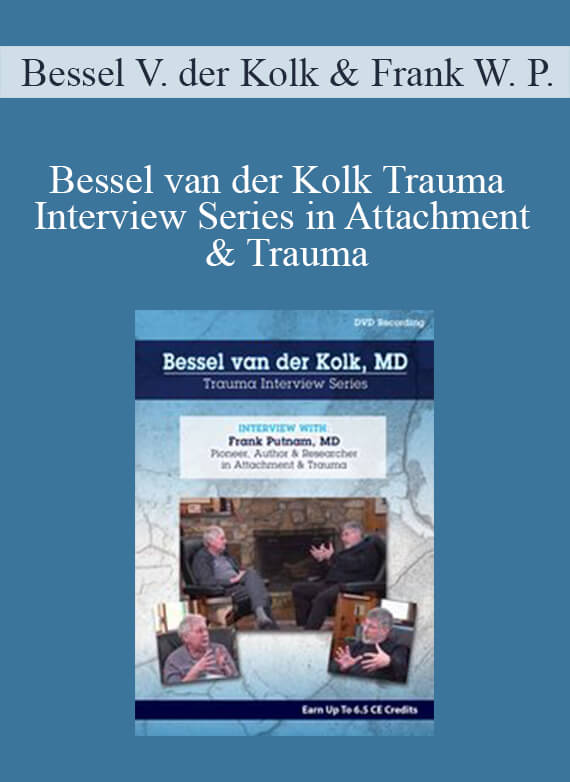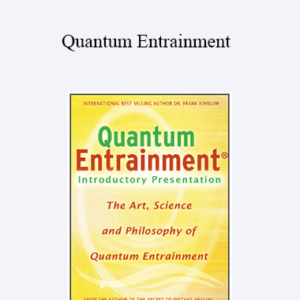 Bessel Van der Kolk & Frank W. Putnam – Bessel van der Kolk Trauma Interview Series: Frank Putnam, MD, Pioneer & Researcher in Attachment & Trauma
Bessel Van der Kolk & Frank W. Putnam – Bessel van der Kolk Trauma Interview Series: Frank Putnam, MD, Pioneer & Researcher in Attachment & Trauma
Recently I was fortunate to engage in a personal interview with my colleague and pioneering researcher, Frank Putnam, MD, who is without question one of the world’s foremost scientists in the field of trauma, dissociation and attachment.
His remarkable research reveals findings that are of significant relevance to trauma treatment today. And in this video interview, you’ll hear first-hand about his dutiful and passionate studies on sexual abuse, transgenerational trauma, and dissociation and multiple personality disorders (DID).
As Frank describes the arc of his discoveries from one intervention project to the next, and our conversation moves from one question to another, you’ll gain an understanding of the impact of trauma on the mind and brain that will immediately inform your trauma treatment.
I invite you to delve into this journey with me to learn of this man’s important work, impact and contributions to the field.
Bessel van der Kolk
- Discuss the clinical implementations of the longitudinal study on childhood abuse as designed and conducted by Dr. Frank Putnam.
- Summarize the trans-generational aspects of trauma and abuse as it informs the therapeutic approach.
- Specify treatment methods that induce a state of change in the trauma client.
- Provide psychoeducation on Dissociative Identity Disorder to improve client understanding of the disorder and the rationale of treatment methods used.
- Articulate clinical strategies to assist the client out of their dissociative state and return their awareness back to the present.
- Summarize the various results of the ACE study as discussed between Dr.’s van der Kolk and Putnam.
Attachment and States of Change: Trauma Clients from Childhood to Adulthood
- Bessel van der Kolk, MD introduces Frank Putnam, MD author of The Way We Are: How States of Mind Influence our Identities, Personality and Potential for Change
- Dr. Putnam’s early work and studies in rapid-cycling Bipolar and Dissociative Identity Disorder.
- Physiology of DID
- State Changes – the transitioning point between the state changes we make as children and adolescents
- Attachment and attunement as children
- 4-generation longitudinal study conclusions of abused and normal children
Early Disrupted Attachments
- Disorganized Attachment “Type D” as a pre-cursor of adulthood physiological and psychological illness
- The mother’s critical role: early patterns and intervening with a mother’s first child
Childhood Abuse: The Adolescent Female
- Cortisol levels
- FSH levels
- Biological versus behavioral aspects of trauma
- Attachment as generational and reverberational qualities
- The “Strange Man” study
Development and States of Change
- Multiple layering of states
- Moving in and out and transitions
- Stuck states or slippery states
Meta-Cognitive Function & Executive Function
- Functions of healthy attachment
- Validation: the critical need to “be seen”
- Genetics versus Trauma as effecting behavior
- Implications for Treatment
The Ohio Home Visit Program Study: Working with Children and Mothers
- 2,000 families in the study
- Maternal depression
- Substance Abuse
- Domestic violence
- Help mothers with state change
- Games, mirroring
- Role for therapist
- Effectiveness of the study and public health
- PCIT: Parent/Child Interaction Therapy
Neuroplasticity
- Brain changes
- Hyper-arousal states “burn out” leaving shutting down
Inducing A State of Change
- Hypnosis – viable treatment that has fallen off the radar but still successful with trauma processing
- The stages of stabilization
- Intrusive states: not seen in PTSD alone
- ACE Study, addiction and maladaptive temporary solutions
- Basic training in the military: the classic state change success story
- Self-compassion: a required element of Mindfulness
Latest Research and Evidence for Drug-Induced State Change
- MDMA: PTSD and combat trauma, initial study results
- Psilocybin – Frank’s personal experience in a study
Language, Meaning and Context
- Creating a coherent narrative
- DSM III to DSM-5
- Developing the Dissociative Experience Scale (DES)
Dissociative Identity Disorder: Story of the Scientist and the Study
- The cyclical nature of studying trauma and dissociation of time
- Lack of literature
- Developing the longitudinal robust study
- The DES
Discussion on the Brain Functions
- Pre-frontal area
- Anterior cingulate
- Intrusive states
How do you help the client get out of the dissociated state?
- Decrease triggers
- Create safety
- Substitute other behaviors
- Self-monitoring: how to build that in the treatment
- How to build stronger meta-cognitive functioning
- Sensory integration: drumming, rhythm
Trans-generational Aspects of Trauma & Abuse
- The predatory personality
- Results of the longitudinal study over generations
- Bethany Brand’s (Towson University) online longitudinal study for client and clinician
- The importance of “telling the truth”
- Value of the histories the professional asks
- How far to dig into the specifics of the trauma
Tag: Bessel van der Kolk Trauma Interview Series: Frank Putnam, MD, Pioneer & Researcher in Attachment & Trauma – Bessel Van der Kolk & Frank W. Putnam Review. Bessel van der Kolk Trauma Interview Series: Frank Putnam, MD, Pioneer & Researcher in Attachment & Trauma – Bessel Van der Kolk & Frank W. Putnam download. Bessel van der Kolk Trauma Interview Series: Frank Putnam, MD, Pioneer & Researcher in Attachment & Trauma – Bessel Van der Kolk & Frank W. Putnam discount.
Salepage: https://catalog.pesi.com/item/20055/
Archive: https://archive.fo/wip/toHNh
Delivery Method
– After your purchase, you’ll see a View your orders link which goes to the Downloads page. Here, you can download all the files associated with your order.
– Downloads are available once your payment is confirmed, we’ll also send you a download notification email separate from any transaction notification emails you receive from coursesblock.com
– Since it is a digital copy, our suggestion is to download and save it to your hard drive. In case the link is broken for any reason, please contact us and we will resend the new download link.
– If you cannot find the download link, please don’t worry about that. We will update and notify you as soon as possible at 8:00 AM – 8:00 PM (UTC 8).
Thank You For Shopping With Us!








